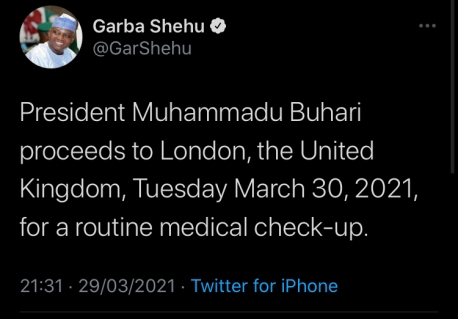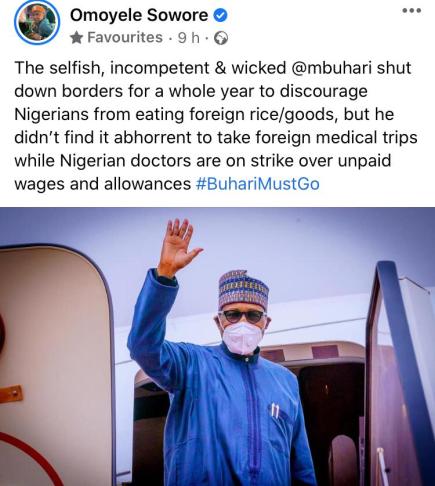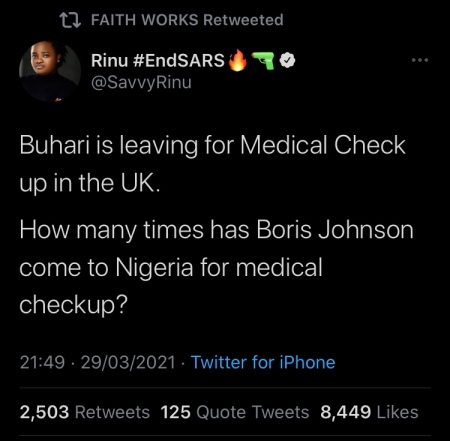On March 30th, Nigerians woke up to the news that our president, who has been very inactive in carrying out his duties, will be heading to the UK for a “medical check-up,” as announced by one of his media aides, Garba Shehu. As usual, the announcement wasn’t shocking to a lot of Nigerians. This is not the first time President Buhari has gone on a medical tourism trip. In fact, he spent over three months in London in 2017 for some undisclosed ailment he went to treat in the European country (see source one, and two).

The problem with this announcement is the shamelessness displayed by the media aides of the president, who blatantly announced that the president will be going on medical tourism, which indirectly implies that the hospitals in the country cannot be trusted and so the president (because of how important he is as president) must go to a “saner clime” with world-class healthcare facilities to get the needed treatment or medical check-up, as they said. They could not think of conducting this medical check-up in the Aso Rock Clinic, which should by far be the safest place to conduct any type of check-up or even surgery in the country, and certainly not in one of the scanty public hospitals in the country that they failed to equip, hence a testament to the dilapidated state of healthcare facilities in the country. At this critical point, there is a question every Nigerian must answer: why should I trust Nigeria’s healthcare system if Buhari cannot trust it? The level of mediocrity in Buhari’s government is laughable and equally disgusting.

A country where mediocrity is the norm
The president and the other people in government branded as “leaders” appointed to provide the social amenities people badly need in the country have consistently failed to provide these amenities. Roads across states in the country (especially in Lagos) are terrible and they usually do not get fixed until dozens of lives have been lost on these roads; the country’s economy experiences recession almost every year; the value of the naira keeps plummeting on a daily basis and don’t get me started on the security issue. I have lived in this country for over 20 years of my life and I, as well as many other Nigerians, can affirm that this is the most unsafe Nigeria has ever been in the past 20 years. This is not far-fetched because never in time have we had terrorism, banditry, kidnappings, and tribal clashes between farmers and herders happening simultaneously and hitting us from left, right, and center until now.

A CEO in Failure
Nigeria is a ticking time bomb and if something is not done to salvage the condition of the country, it could get much worse. Buhari has consistently failed in every aspect of his campaign promise but this should not be a surprise at all. What can you make of someone whose success in the national secondary school certificate examinations is still disputed to date? Yes, our president’s O’Level results are highly contested. If he failed his exams and failed in other positions (like his failure as the Minister for Petroleum in 1977 and subsequently the Head of State in 1984), what can you expect when he is president? You cannot expect an orange tree to grow mangoes. It will always grow oranges.
Reimagining Development
I have never been one that preaches against the collaboration of African states with the West. Yes, I am a pan-African and I believe in one united Africa, intra-African trade, and the likes but this doesn’t mean we should not collaborate with other counterparts on other continents. Contrary to my former belief and popular opinion, I think collaboration with foreign countries is imperative now because of the chaotic leadership crisis we face on the continent. However, this must be a different kind of collaboration. Not one that places other countries’ needs above ours like our past and current leaders have done without critical thought because of their greediness. I will maybe talk about this in a future blog post (or even a vlog *winks*).
With globalization increasing at a rapid scale today, it would be ill-advised to isolate oneself from this cooperation and withdraw to oneself in the name of pan-Africanism. Globalization demands that we partner up to push our individual countries’ progress further. If done right, it is a beautiful thing. At the same time, when we talk about globalization, we must also talk about development as they go hand-in-hand.
I am not a development expert but I know a thing or two about the theories (and some practical aspects) of development. In simple terms, “development” has always been seen as the solution to the “problems” facing Third World countries. Basically, the West or countries in the global north must always come to our rescue to help us (in the global south) to “solve” our problems since they (the global north) are the development experts. Afterall, they are the ones whose countries are labelled “developed.” But this is faulty and needs to be re-evaluated.
Most times, whenever the West talks about development, they talk about “helping” African countries by providing loans and financial support to us and we seem to always agree with this method of “development”. This is why our governments always run to the IMF and the World Bank to collect loans that they cannot pay back in the present and will therefore, take multiple generations to pay back. Also, whenever they (our “self-acclaimed” leaders) collect these loans, they do not utilize them for the exact purpose they went to collect them in the first place; they do not use them in providing the “infrastructure” Buhari and his aides have consistently preached about as justification for collecting these loans. One way or another, these monies find themselves in the bank accounts of individuals who have chosen to serve their personal interests rather than those of the people that elected them into office. This is not development. This is manipulation. This is wickedness. It is a partnership that is already doomed to fail.
“Development was—and continues to be for the most part—a top-down, ethnocentric, and technocratic approach, which treated people and cultures as abstract concepts, statistical figures to be moved up and down in the charts of ‘progress'” (p. 44). Escobar seems to believe that one of the main underlying motives of development is not necessarily to eliminate poverty, but instead to increase opportunities and production possibilities for First World countries (like President Buhari paying an exorbitant amount of money from the state’s treasury for his medical “check-up” in London). The World Bank “should be seen as an agent of economic and cultural imperialism at the service of the global elite” (p. 167). – Excerpts from Arturo Escobar’s book: Encountering Development: The Making and Unmaking of the Third World.
Development needs to be reimagined. It needs to change from “we will give you money” to “we will empower your people to generate money within your borders.” This is basically saying: “we won’t give you fish but we’ll teach you how to fish.” You cannot achieve development by borrowing money and spending it on frivolities or on “ghost projects” you cannot account for. You cannot achieve development by allowing African presidents to continue their shameless medical tourism in Europe and other parts of the West. This way African leaders will start to take seriously the numerous development challenges that we face today, starting from the issue of healthcare.

How Other Countries Can Help
So how can the UK help? How can other countries in the global north help us achieve the “development” we so badly seek to achieve? The UK can start by banning medical tourism by top politicians in developing countries like Nigeria. It is disgraceful to go elsewhere as the first citizen of a country to seek medical help. It is more appalling to do this during the time of a global pandemic that has killed millions. Can the UK Prime Minister go to Croatia or Germany for such? That is how ridiculous it sounds.
Also, if other developed countries and organizations like the UN, World Bank and IMF truly care about the development of Africa, they will stop giving out (or extremely minimize) these loans (especially to a country like Nigeria who has the largest economy on the continent!). With due respect to Somalia and Togo, if these countries are borrowing money from the IMF and the World Bank every now and then, this does not justify that the largest economy on the continent must also do the same! Nigeria needs to have some dignity and as long as our leaders do not care, this dignity is unachievable as they will keep disgracing us like the case of Buhari’s Medical Tourism.

An “Extreme” Issue That Perhaps Needs an “Extreme” Solution
Let us be honest with ourselves: Development isn’t always about organizing large conferences and sometimes, wasting resources on huge gatherings with little outcome or impact on the actual people that need this “development.” It is putting into place (very uncomfortable) policies, like the ones suggested above, to ensure that “that development” is achieved. When this difficult and unconventional approach to development is sought and implemented by various countries in the West and other parts of the world, such that African leaders across all levels (local, state, regional and national) are barred from seeking medicare abroad and sent back home to patronize the “world class hospitals they built in their local governments and villages,” I tell you they will be forced to return home to declare something like a state of emergency on the healthcare situation of their countries.

In a few months, we will start seeing the dire changes we need in the health sector because if they have nowhere to run to, no country to go, no world-class facility abroad to patronize, the only other option that they have is to develop the healthcare system of their various countries; and they will do this urgently and aggressively. This is because even if they do not realize the importance of good healthcare facilities for the masses, they will at least realize the importance of good healthcare facilities for themselves and their family members who cannot go abroad for medicare anymore. Gradually, the solution of quality healthcare for developing countries can be achieved seamlessly. With no money to borrow and no place to go, they will cut spending and minimize costs to ensure that world-class healthcare facilities are provided and doctors are well paid.

This suggestion may sound extreme but if you know the extreme conditions (source three and four) that people that need “development” like good healthcare facilities go through everyday, you will see that the above should be achievable. Solving development issues is not bread and butter, it is not for the faint of heart and difficult decisions must be made if we truly care about the people that need this “development.”
I look forward to a future (many decades from now) where we (and future generations) will look back at Garba Sheu’s tweet and find it amusing and highly ridiculous that at some point in 2021, a sitting president of the largest African economy actually went on medical tourism in another country.
Reference:
Escobar, A. (1994). Encountering Development: The Making and Unmaking of the Third World. Princeton University Press.
